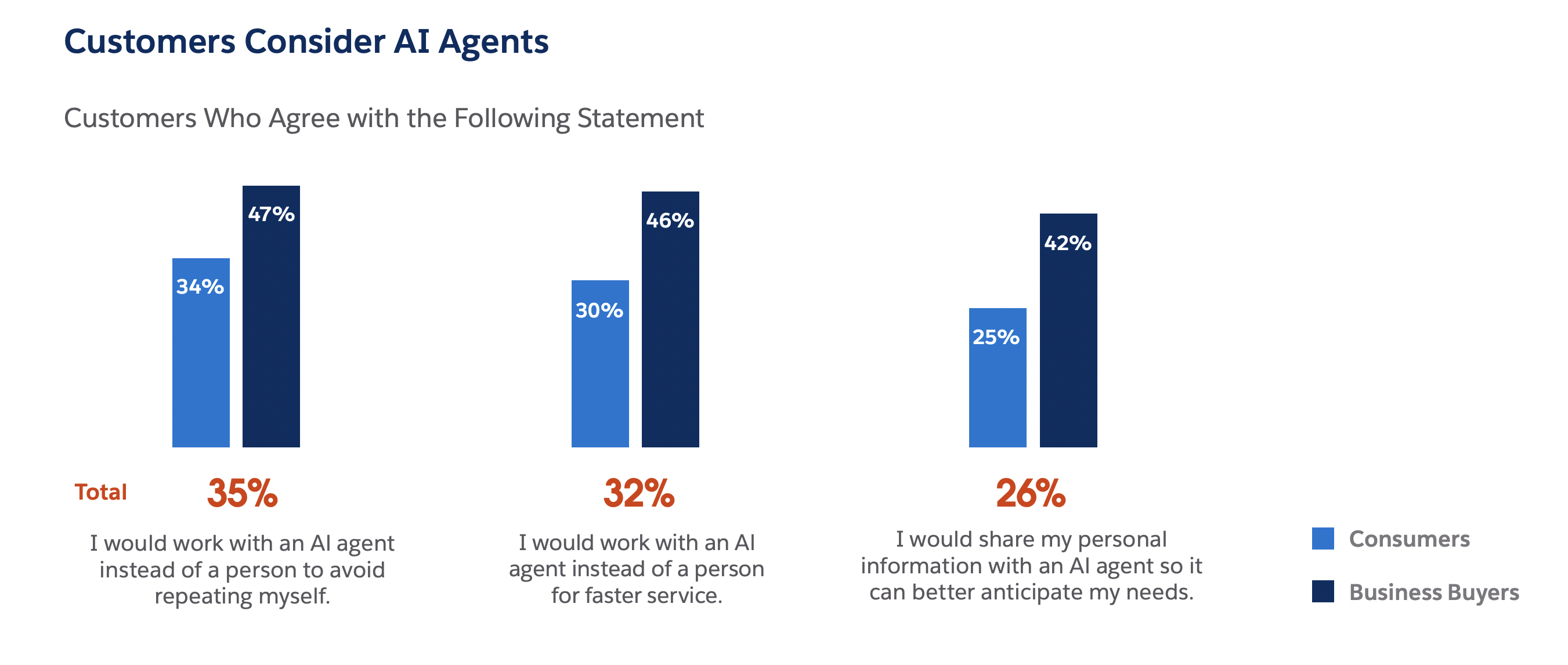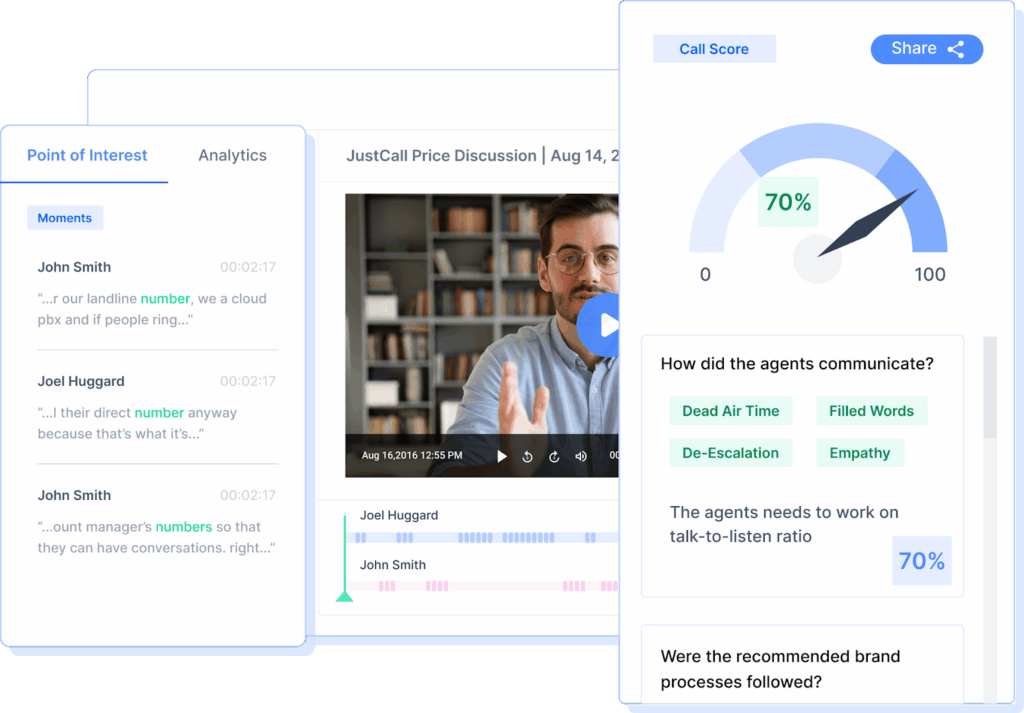Using AI to Enhance Sales Team Performance
Sales teams today operate in a space more challenging than ever before. Buyers conduct extensive research before speaking to a representative, buying cycles are longer, and expectations for personalized communication are higher. At the same time, sales leaders face pressure to hit aggressive quotas and maintain consistent revenue growth.
By adding artificial intelligence into sales workflows, organizations can empower sales teams with sharper insights, greater efficiency, and tools that make every interaction more meaningful. This article explores how AI for sales teams boosts performance, the practical applications already in use, and the steps required to adopt AI effectively.
Quick Takeaways
- AI for sales teams automates repetitive tasks and frees reps to focus on selling.
- Predictive lead scoring ensures reps prioritize high-value prospects.
- Personalized outreach at scale improves engagement and conversion rates.
- AI-driven forecasting delivers more accurate revenue visibility.
- Call analytics and coaching tools help sales leaders develop stronger teams.
The Current Challenges Sales Teams Face
B2B selling is increasingly complex, and sales representatives face multiple hurdles. Buyers now expect digital-first interactions and often prefer rep-free experiences until late in the process. This makes it harder for sales reps to build trust and position themselves as advisors.
Manual processes create additional obstacles. Prospecting, data entry, and scheduling consume valuable time that could otherwise be spent selling. Inconsistent or incomplete CRM data undermines lead scoring and forecasting, leaving teams uncertain about where to focus their efforts. Finally, the demand for personalized outreach at scale pushes sales reps beyond what traditional tools allow.
Without new approaches, these challenges erode productivity and limit the ability to close high-value deals.
How AI Supports Sales Teams
AI for sales teams addresses these challenges by adding intelligence, automation, and personalization to existing workflows. Machine learning algorithms, natural language processing, and predictive analytics all contribute to making sales processes smarter and more efficient.
AI supports sales teams in three critical ways:
- Automation: Streamlining administrative work like note-taking, data entry, and scheduling.
- Intelligence: Providing real-time insights into buyer intent, deal likelihood, and churn risk.
- Personalization: Enabling reps to deliver messages and solutions tailored to each prospect.
Instead of replacing sales reps, AI enhances their capabilities, allowing them to spend more time building relationships and closing deals.
Benefits of AI for Sales Teams
Smarter Prospecting and Lead Scoring
Traditional lead scoring relies on rigid rules that rarely reflect true buying intent. AI models analyze a broad range of variables, from browsing behavior to firmographic data, to identify which leads are most likely to convert. This ensures sales reps spend less time chasing cold leads and more time engaging prospects with real potential.
Personalized Outreach at Scale
Sales reps know that personalization improves engagement, but doing it consistently across hundreds of accounts is unrealistic without AI. With AI-driven tools, messaging can adapt to each buyer’s needs. Suggested subject lines, meeting times, and product recommendations are tailored automatically, increasing the likelihood of meaningful conversations.
Recent research shows that buyers are increasingly comfortable with AI interactions. According to Salesforce, 47% of business buyers and 34% of consumers would work with an AI agent instead of a person to avoid repeating themselves. Nearly half of business buyers also say they would use AI for faster service, while 42% would even share personal information if it meant better anticipation of their needs.

These findings remind us that AI-driven personalization is quickly becoming an expectation.
Streamlined Sales Workflows
Repetitive tasks reduce selling time. AI takes on administrative work such as updating CRM records, drafting call notes, and scheduling follow-ups. These automations free sales reps to focus on building relationships and advancing deals.
Improved Forecasting Accuracy
Accurate forecasting is essential for resource allocation and goal setting. AI analyzes historical sales data, pipeline activity, and external market signals to predict outcomes with higher accuracy. Leadership teams gain clearer visibility into expected revenue and can adjust strategies accordingly.
Enhanced Coaching and Training
AI-powered call analytics evaluate conversations for tone, sentiment, and keyword usage. Sales managers can use this information to identify individual strengths and areas for improvement. Targeted coaching becomes easier, helping sales teams improve performance over time.

Alt-text: Screenshot of a call analytics dashboard shows example of AI-powered call analytics tools for coaching and training
Key AI Applications in Sales
- Conversational AI: Chatbots and virtual assistants engage prospects in real time, qualify leads, and route them to the right representative.
- Sales Enablement Tools: AI recommends the most relevant case studies, whitepapers, or product sheets to share during specific stages of the buyer’s journey.
- Predictive Analytics: Models forecast which opportunities are most likely to close and which accounts are at risk of churn, enabling proactive engagement.
- Speech and Sentiment Analysis: Real-time analysis of buyer tone during calls helps reps adjust their approach on the spot.
- CRM Augmentation: AI automatically enriches and updates CRM records, ensuring data completeness without burdening sales reps.
Steps to Successfully Adopt AI in Sales
Define Sales Goals and Pain Points
Identify what you want AI to solve, whether it’s improving win rates, shortening sales cycles, or boosting retention. Clear objectives prevent wasted investment and keep projects aligned with business outcomes.
Assess Existing Tools and Integrations
Many CRM and automation platforms already offer AI functionality. Before adding new tools, evaluate what you already have to avoid redundancy and simplify adoption.
Prioritize Data Readiness
AI models rely on accurate, structured data. Invest in data hygiene practices to ensure CRM systems are complete and reliable. Without this foundation, AI outputs will be less effective.
Pilot AI Solutions
Start small with focused applications such as predictive lead scoring or call analytics. Pilots allow you to measure value quickly and refine approaches before expanding.
Train Sales Teams for Adoption
Sales reps may worry that AI threatens their role. Provide training that emphasizes AI as a support system, not a replacement. When teams understand how AI enhances their work, adoption rates improve.
Measure and Iterate
Use clear metrics such as conversion rates, deal velocity, and rep productivity to measure success. Continuous evaluation ensures AI tools deliver sustained value.
Challenges and Risks
Integrating AI for sales teams is not without obstacles. Reps may resist new technology if they feel it undermines their role. Over-reliance on automation can also risk depersonalizing outreach if not balanced with human judgment. Data privacy regulations like GDPR require careful compliance, especially when AI processes personal information.
Finally, integrating AI with legacy systems can be complex and costly. Addressing these challenges upfront improves the likelihood of success.
The Future of AI for Sales Teams
Looking ahead, AI will play an even greater role in shaping how sales teams perform.
Real-time AI assistants will coach reps during live calls, suggesting next steps and responses as conversations unfold. Predictive revenue intelligence will align sales and marketing teams around shared insights, improving coordination.
AI-driven coaching will adapt to each rep’s learning style, creating more personalized training. Account-based strategies will also benefit from AI insights, helping teams engage entire buying committees more effectively.
The future is not about replacing human sales talent but equipping it with the tools to be faster, smarter, and more effective.
Integrate AI Today with Televerde
AI for sales teams represents a significant opportunity to enhance productivity, personalization, and accuracy. From smarter prospecting to improved forecasting, AI augments the capabilities of sales representatives while giving leadership greater visibility into performance.
Sales organizations that begin integrating AI today will gain a decisive edge tomorrow. By defining goals, preparing data, piloting solutions, and training teams, companies can ensure a smooth transition into AI-powered selling.
Ready to empower your sales team with AI? Televerde’s AI-driven solutions provide the insights and automation your team needs to close deals faster and build stronger customer relationships.


